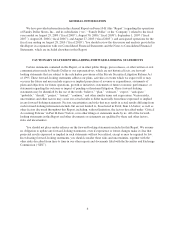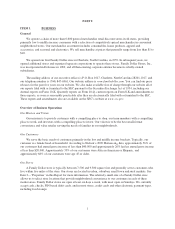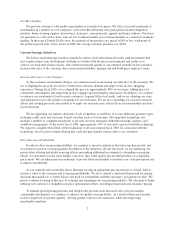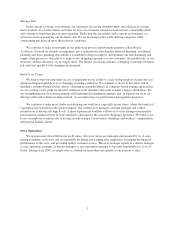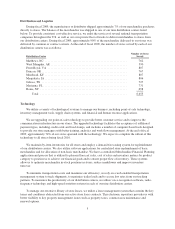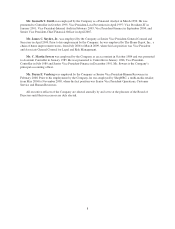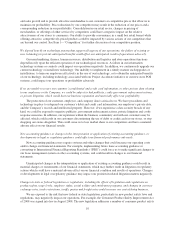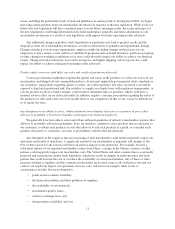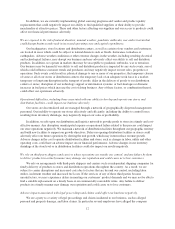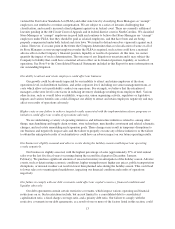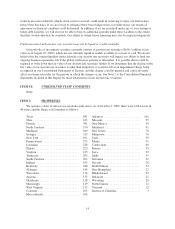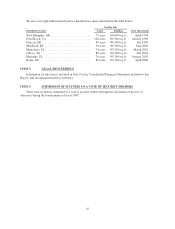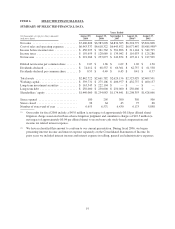Family Dollar 2009 Annual Report Download - page 18
Download and view the complete annual report
Please find page 18 of the 2009 Family Dollar annual report below. You can navigate through the pages in the report by either clicking on the pages listed below, or by using the keyword search tool below to find specific information within the annual report.and sales growth and to provide attractive merchandise to our customers at competitive prices that allow us to
maintain our profitability. Price reductions by our competitors may result in the reduction of our prices and a
corresponding reduction in our profitability. Consolidation in our retail sector, changes in pricing of
merchandise, or offerings of other services by competitors could have a negative impact on the relative
attractiveness of our stores to consumers. Our ability to provide convenience in a small box retail format while
offering attractive, competitively-priced products could be impacted by various actions of our competitors that
are beyond our control. See Item 1—“Competition” for further discussion of our competitive position.
We depend heavily on technology systems that support all aspects of our operations; the failure of existing or
new technology to provide anticipated benefits could affect our anticipated results of operations adversely.
Our merchandising, finance, human resources, distribution and logistics and store operations functions
depend heavily upon the efficient operation of our technological resources. A failure in our information
technology systems or controls could impact our operations negatively. In addition, we continuously upgrade our
current technology or install new technology. Our inability to implement in a timely manner such upgrades or
installations, to train our employees effectively in the use of our technology, or to obtain the anticipated benefits
of our technology, including technology associated with our Project Accelerate initiative or our new store POS
systems, could impact our operations or profitability adversely.
If we are unable to secure our customer’s confidential and credit card information, or other private data relating
to our employees or the Company, we could be subject to bad publicity, costly government enforcement actions,
or private litigation, which would hurt our business reputation and materially affect our profitability.
The protection of our customer, employee, and company data is critical to us. We have procedures and
technology in place to safeguard our customer’s debit and credit card information, our employee’s private data,
and the Company’s records and intellectual property. However, if we experience a data security breach of any
kind, we could be exposed to negative publicity, government enforcement actions, private litigation and costly
response measures. In addition, our reputation within the business community and with our customers may be
affected, which could result in our customers discontinuing the use of debit or credit cards in our stores, or stop
shopping our stores altogether. This could cause us to lose market share to our competitors and have a material
adverse effect on our financial results.
New accounting guidance or changes in the interpretation or application of existing accounting guidance, or
developments in legal or regulatory guidance could affect our financial performance adversely.
New accounting guidance may require systems and other changes that could increase our operating costs
and/or change our financial statements. For example, implementing future lease accounting guidance or
converting to International Financial Reporting Standards (“IFRS”) could force us to make significant changes to
our lease management system or other accounting systems, and could result in changes to our financial
statements.
Unanticipated changes in the interpretation or application of existing accounting guidance could result in
material charges or restatements of our financial statements, which may further result in litigation or regulatory
actions which could have a material adverse effect on our financial condition and results of operations. Changes
or developments in legal or regulatory guidance may impact our position in related litigation matters negatively.
Changes in state or federal legislation or regulations, including the effects of legislation and regulations on
product safety, wage levels, employee rights, social welfare and entitlement programs, and changes in currency
exchange rates, trade restrictions, tariffs, quotas and freight rates could increase our cost of doing business.
We are exposed to the risk that new federal or state legislation, particularly in new product safety laws and
regulations, may negatively impact our operations. For example, the Consumer Product Safety Improvement Act
of 2008 was signed into law in August 2008. The new legislation addresses a number of consumer product safety
10


